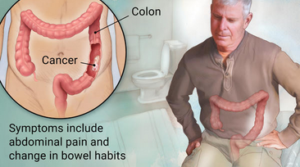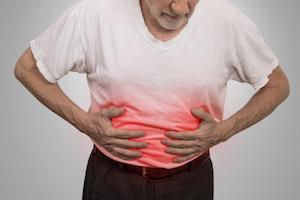 According to the American Cancer Society, approximately 140,000 men and women will be diagnosed with some form of colorectal cancer this year. In fact, the most common form of colorectal cancer is colon cancer.
According to the American Cancer Society, approximately 140,000 men and women will be diagnosed with some form of colorectal cancer this year. In fact, the most common form of colorectal cancer is colon cancer.
Health professionals often refer to colon cancer as a silent killer. It takes years for the disease to develop and symptoms to manifest. If you are concerned about developing colon cancer, it is essential that you learn to recognize the early symptoms of this frightening disease.
By detecting colon cancer in its early stages, your chances of survival will increase.
Here is our listing of 10 early warning signs of colon cancer that may save your life.
1. Prolonged Diarrhea
Diarrhea is an abnormal condition that should not last more than a couple of days. If you experience persistent diarrhea that lasts for weeks, it could be a sign that a cancerous tumor is obstructing your bowel. In conjunction with watery stools, other symptoms you should pay close attention to are vomiting, nausea, stomach pains and gas. Persistent diarrhea is a condition that should never be taken lightly. Immediately consult a physician because persistent diarrhea can contribute to dehydration and nutritional deficiencies.
2. Bloody Stools
Bloody stools can be caused by hemorrhoids and colon cancer. It is important for you to be able to differentiate between symptoms of the two conditions. With hemorrhoids, small amounts of bright red blood may be noticeable when you wipe your bottom. With colon cancer, black or dark red blood may be present in your stool. Whether the blood is bright red or black, the presence of blood indicates a problem that needs to be examined. If you detect blood in your stool, this condition should not be ignored. Immediately schedule an appointment with your physician to be tested for colon cancer.
3. Prolonged Constipation
Constipation is an uncomfortable condition. If it lasts for weeks, it can be an indication that you have colon cancer. A healthy digestive tract regularly eliminates your waste. A prolonged bout with constipation should be checked out by your doctor. According to the Asian Pacific Journal of Cancer, there is a correlation between prolonged constipation and colon cancer. If you find yourself struggling to make a bowel movement for more than 2 weeks, you should definitely consult a physician. Resist the urge to take matters into your own hands by masking your constipation problem with laxatives.
 4. Lower Abdominal Pain
4. Lower Abdominal Pain
The presence of pain in your abdomen is an indication that something is wrong with your body. One of the most common signs of colon cancer is lower abdominal pain and tenderness. If you feel pain when you touch your lower abdomen, you should immediately share this information with your doctor. This symptom could signal a cancerous tumor in your colon. In many cases, persistent abdominal pain indicates colon cancer has spread to other parts of your body.
5. Thin Stools
The consistency of your stools can vary depending on your food intake. However, bowel movements should not be thin and narrow for long periods of time. A healthy digestive system releases bowel movements that are long, smooth and bulky. Stools that are thin and narrow can indicate the presence of a cancerous tumor that is obstructing your colon. Colon obstruction can restrict the passageway of your bowel movements. Your doctor should be contacted to determine whether this condition indicates that you have colon cancer.
6. Urgent Bowel Movements
A natural bowel movement develops over a period of time. In most instances, you should not frequently feel sudden urges to have a bowel movement. When you have colon cancer, you may feel as if you have to make an urgent bowel movement after you have made one. Furthermore, you can feel the urgency to go, but you do not pass anything. This condition is abnormal, and it should not be dismissed.
 7. Red Blood Cell Anemia
7. Red Blood Cell Anemia
The presence of colon cancer decreases your red blood cell count. A low red blood cell count is called anemia. Common symptoms of anemia include an irregularly fast heartbeat, unusually pale skin, dizziness, cold feet/hands and shortness of breath. Blood loss due to colon cancer is the result of a bleeding tumor. If you are experiencing anemia, you should bring this matter to your doctor’s attention. Your doctor will test your blood to determine the extent of your anemia.
8. Rapid Weight Loss
It is understandable for you to lose weight if you are eating a healthy diet and exercising. However, rapid weight loss without dietary changes and exercise is a cause for concern. If you have unintentionally lost more than 10 percent of your weight within 6 months, it is considered unexplained rapid weight loss. Cancerous tumors can cause a decrease in your appetite. As a result, you will eat less and lose weight quickly.
9. Persistent & Painful Gas or Bloating
On some occasions, you may eat foods that do not agree with your digestive system. This may result in occasional bouts with gas and bloating. Although you should monitor any presence of discomfort, occasional gas and bloating may not be a cause for concern. Persistent and painful gas and bloating are uncomfortable, and they are symptoms of colon cancer. Your doctor will be able to perform tests to determine the cause of your digestion difficulties.
 10. Constant Fatigue
10. Constant Fatigue
Experiencing fatigue is different from being tired. When you are fatigued, you feel drained, weak and sluggish. You feel as if you do not have enough energy to perform basic tasks without getting exhausted. You should be especially concerned if you are experiencing fatigue when you wake up in the morning. This could be a sign of anemia that is caused by a cancerous tumor in your colon. Fatigue is not a healthy condition, and you need to contact your doctor to get a diagnosis of the underlying cause of your fatigue.
If you experience any of these symptoms, it is vital that you take them seriously. Your chances of surviving a colon cancer diagnosis increase if the cancer is diagnosed early.
A Stage 1 colon cancer diagnosis has a 5-year survival rate of 92 percent. A Stage 4 colon cancer diagnosis has a 5-year survival rate of 11 percent .
As you can see, your chances of living a healthy life after a colon cancer diagnosis drastically decrease when it is detected at a later stage. When cancer is diagnosed before it spreads to other organs, more treatment options are available to you.
MORE… Colon Cancer: Signs and Symptoms, Stages, Treatments, & Causes
Written by Dorothy Gass RM Healthy ~ January 30, 2018
